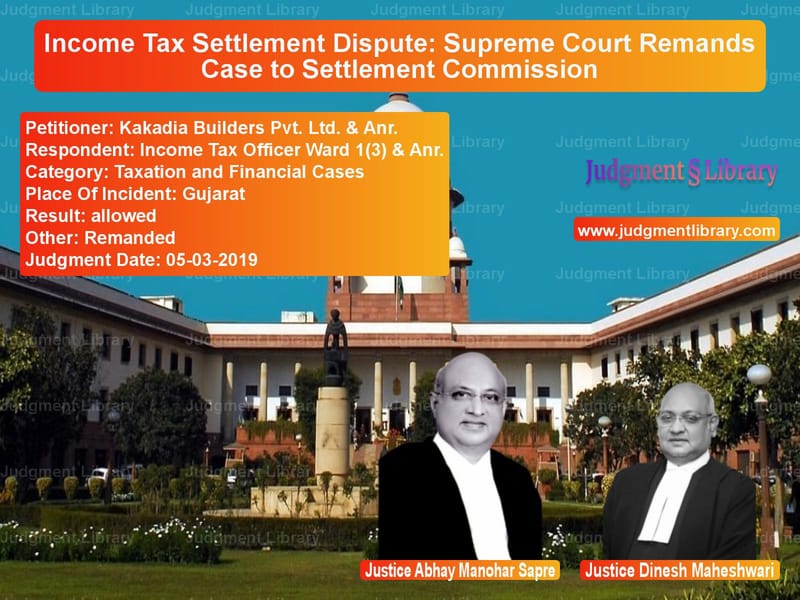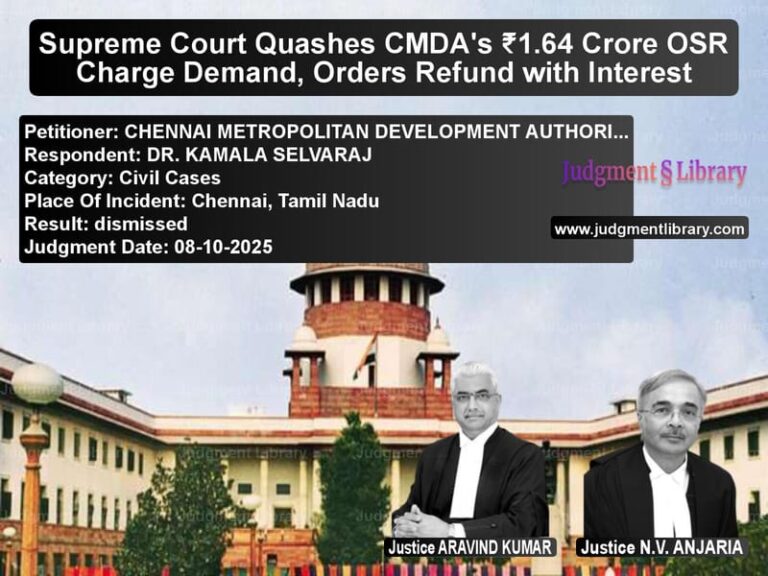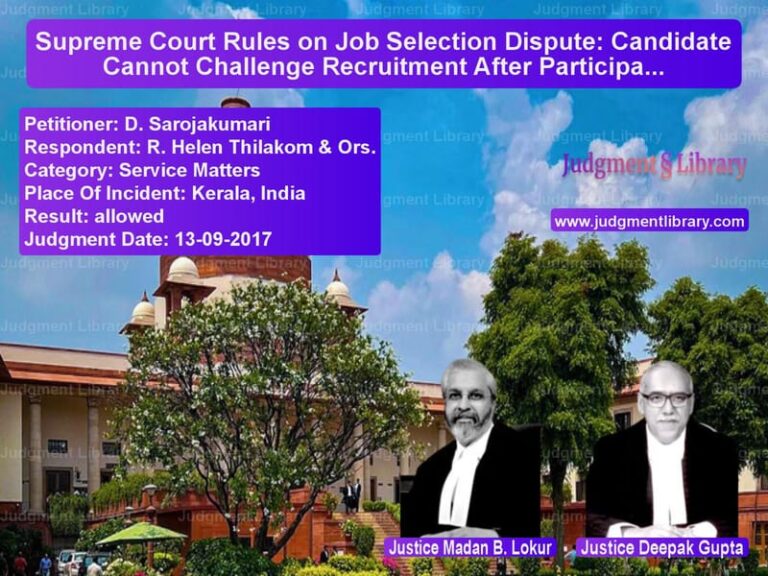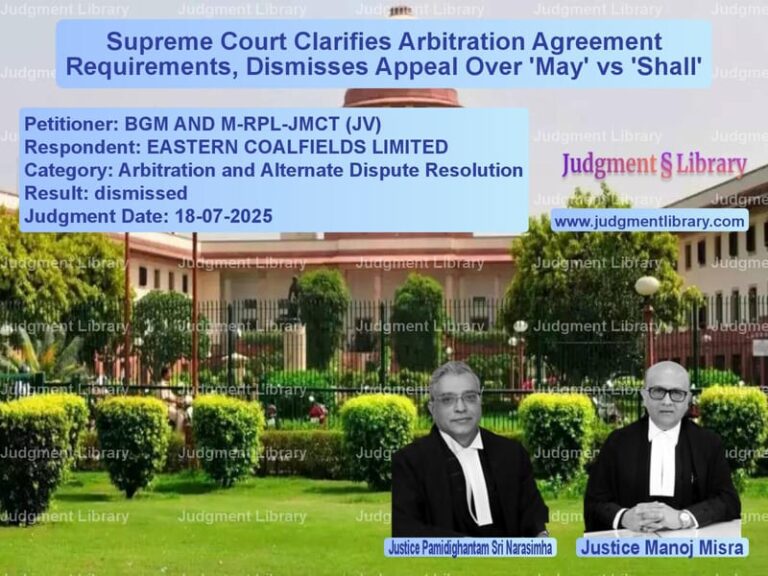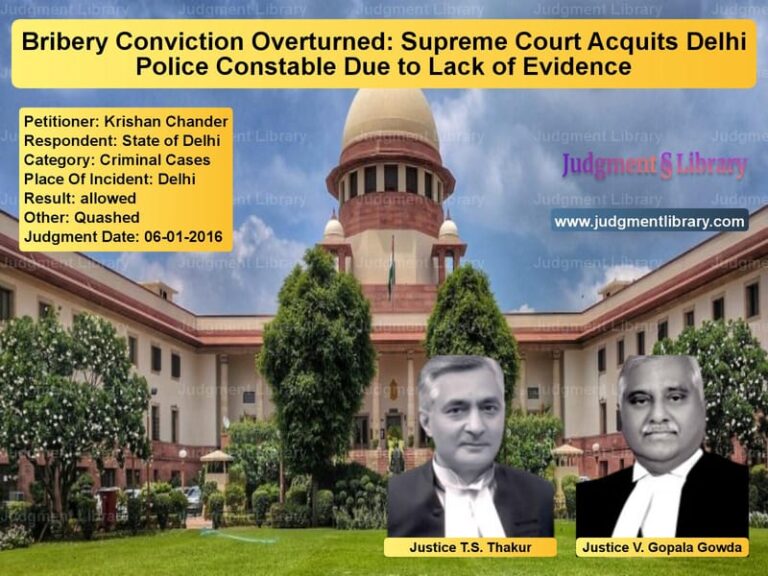Income Tax Settlement Dispute: Supreme Court Remands Case to Settlement Commission
The case of Kakadia Builders Pvt. Ltd. & Anr. v. Income Tax Officer Ward 1(3) & Anr. revolves around a tax settlement dispute involving a search and seizure operation under the Income Tax Act, 1961. The Supreme Court, in its judgment dated March 5, 2019, remanded the case back to the Settlement Commission for reconsideration of interest waiver issues.
This case is significant as it deals with the powers of the Income Tax Settlement Commission (ITSC) regarding interest waiver and the scope of judicial intervention in tax settlement matters.
Case Background
The appellants, Kakadia Builders Pvt. Ltd. and its promoter director, were subjected to a search and seizure operation on January 19, 1994. Following this, assessment proceedings were initiated against them to determine tax liability.
During these proceedings, the appellants filed settlement applications before the ITSC on March 12, 1996, and September 3, 1996, seeking to settle their tax matters under Chapter XIXA of the Income Tax Act.
On August 11, 2000, the ITSC passed an order under Section 245D(4), making certain additions to the appellants’ income while waiving interest under Sections 234A, 234B, and 234C.
However, the Revenue (Income Tax Department) challenged this order by filing a rectification application under Section 154 on July 26, 2002, arguing that the interest waiver was beyond the ITSC’s jurisdiction. The appellants also filed rectification applications seeking modifications in the order.
On October 11, 2002, the ITSC dismissed the appellants’ applications but allowed the Revenue’s rectification plea, reversing the interest waiver.
Aggrieved, the appellants filed petitions before the Gujarat High Court in 2004. The High Court, on March 3, 2014, set aside the ITSC’s rectification order and granted liberty to the Revenue to challenge the original ITSC order dated August 11, 2000.
The Revenue then filed fresh petitions before the Gujarat High Court in 2014, challenging the original ITSC order. The High Court, in its order dated July 28, 2016, reversed the ITSC’s waiver of interest, effectively modifying its original order.
The appellants challenged this decision before the Supreme Court.
Petitioner’s Arguments
The appellants, represented by Senior Advocate R.P. Bhatt, contended:
- The High Court exceeded its jurisdiction by modifying the ITSC’s order.
- The ITSC had discretionary powers to waive interest, and its decision should not have been interfered with.
- The Revenue’s rectification application under Section 154 was invalid, as the ITSC does not have the power to alter its final order under this provision.
- The High Court erred by effectively reinstating the ITSC’s rectification order, which had already been set aside.
Respondent’s Arguments
The Revenue, represented by Senior Advocate K. Radhakrishnan, argued:
- The ITSC lacked the authority to waive interest under Sections 234A, 234B, and 234C, as held by the Supreme Court in Commissioner of Income Tax, Mumbai v. Anjum M.H. Ghaswala & Ors. (2002) 1 SCC 633.
- The ITSC’s order granting interest waiver was contrary to law and needed correction.
- The High Court correctly intervened to rectify the mistake and uphold the statutory requirement of interest payment.
Supreme Court’s Observations and Ruling
The Supreme Court referred to two key Constitution Bench rulings:
- Commissioner of Income Tax, Mumbai v. Anjum M.H. Ghaswala & Ors. (2002) 1 SCC 633: Held that the ITSC does not have the power to waive interest under Sections 234A, 234B, and 234C, except as permitted under CBDT circulars issued under Section 119.
- Brij Lal & Ors. v. Commissioner of Income Tax, Jalandhar (2011) 1 SCC 1: Reaffirmed that the ITSC cannot alter its final order by invoking Section 154 for levying interest.
The Supreme Court found that when the ITSC passed its order on August 11, 2000, the legal position regarding its powers was unclear. Since the issue had been subsequently clarified by the two Constitution Bench rulings, the case needed fresh consideration.
The Court held that the Gujarat High Court had committed a jurisdictional error by modifying the ITSC’s order directly instead of remanding the matter for reconsideration:
“The High Court should have set aside the ITSC order and remanded the case for deciding the issue of interest waiver afresh in light of the law laid down in Ghaswala and Brij Lal.”
Accordingly, the Supreme Court:
- Set aside the Gujarat High Court’s order.
- Set aside the ITSC’s order dated August 11, 2000, but only regarding the interest waiver.
- Remanded the case to the ITSC for fresh consideration of the interest waiver issue.
- Directed the ITSC to decide the matter within six months.
Conclusion
The Supreme Court’s judgment in this case reinforces important principles of tax law and judicial review:
- The ITSC does not have the power to waive interest under Sections 234A, 234B, and 234C beyond the limits prescribed by law.
- Courts should refrain from directly modifying tax settlement orders and should instead remand cases for reconsideration where necessary.
- The ITSC must apply the law as clarified by the Supreme Court’s Constitution Bench rulings.
- Taxpayers and tax authorities must adhere to statutory provisions regarding interest payments and cannot rely on discretionary waivers by the ITSC.
By remanding the case to the ITSC, the Supreme Court ensured that the matter would be decided in accordance with established legal principles, maintaining fairness in tax settlement proceedings.
Petitioner Name: Kakadia Builders Pvt. Ltd. & Anr..Respondent Name: Income Tax Officer Ward 1(3) & Anr..Judgment By: Justice Abhay Manohar Sapre, Justice Dinesh Maheshwari.Place Of Incident: Gujarat.Judgment Date: 05-03-2019.
Don’t miss out on the full details! Download the complete judgment in PDF format below and gain valuable insights instantly!
Download Judgment: Kakadia Builders Pvt vs Income Tax Officer W Supreme Court of India Judgment Dated 05-03-2019.pdf
Direct Downlaod Judgment: Direct downlaod this Judgment
See all petitions in Income Tax Disputes
See all petitions in Tax Evasion Cases
See all petitions in Tax Refund Disputes
See all petitions in Banking Regulations
See all petitions in Judgment by Abhay Manohar Sapre
See all petitions in Judgment by Dinesh Maheshwari
See all petitions in allowed
See all petitions in Remanded
See all petitions in supreme court of India judgments March 2019
See all petitions in 2019 judgments
See all posts in Taxation and Financial Cases Category
See all allowed petitions in Taxation and Financial Cases Category
See all Dismissed petitions in Taxation and Financial Cases Category
See all partially allowed petitions in Taxation and Financial Cases Category

